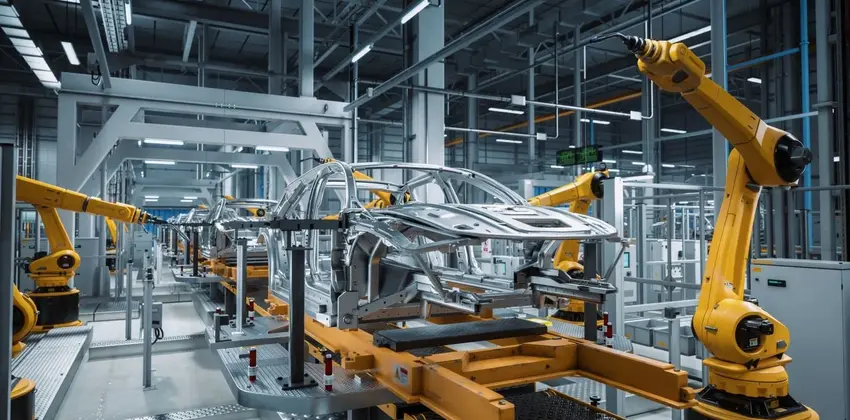UK Vehicle Production Falls as Global Economic Uncertainty Grows
The UK’s automotive industry is facing mounting challenges as vehicle production declined significantly in February 2024. According to the Society of Motor Manufacturers and Traders (SMMT), total car and commercial vehicle production fell by nearly 12% year-on-year, with a sharp drop in electric and hybrid vehicle output.
This downturn is driven by multiple factors, including global economic uncertainty, rising production costs, and new trade tariffs imposed by the United States. With UK car exports heavily dependent on overseas markets, the latest data paints a concerning picture for the country’s automotive sector.
Key Highlights from the UK Vehicle Production Report
✔️ UK vehicle production fell 12% in February to 82,178 units compared to the previous year.
✔️ Electric and hybrid vehicle output declined by 5.6%, despite rising global demand for EVs.
✔️ UK car production for the domestic market plummeted 33% year-on-year.
✔️ The industry is facing fresh pressure due to Trump’s 25% tariff on imported vehicles.
✔️ Over 80% of UK-produced cars are exported, with the U.S. being the second-largest market after the EU.
✔️ UK car production has now been in a steady decline for 12 consecutive months.
Why is UK Vehicle Production Declining?
Several economic and industry-specific factors are contributing to this sustained decline:
1. Global Economic Uncertainty
- Rising interest rates and inflation have slowed vehicle demand worldwide.
- Economic slowdowns in major markets like China, the EU, and the U.S. are impacting UK car exports.
- Supply chain disruptions continue to affect production efficiency and cost.
2. Declining Domestic Demand
- UK car sales are weakening due to higher vehicle costs and sluggish consumer confidence.
- The UK government’s policy shifts on electric vehicle incentives have caused uncertainty in the market.
- Domestic car production fell 33% year-on-year, reflecting weakening local demand.
3. Impact of Trump’s 25% Auto Tariff
- The U.S. government announced a 25% tariff on imported vehicles, directly impacting UK car manufacturers.
- The U.S. is the second-largest export market for UK-made vehicles, accounting for nearly 20% of total exports.
- The move has escalated trade tensions, with potential retaliatory tariffs from affected U.S. allies.
4. Challenges in Electric and Hybrid Vehicle Production
- Production of battery electric, plug-in hybrid, and hybrid vehicles fell by 5.6%.
- Supply chain disruptions for critical EV components have slowed manufacturing.
- High battery costs and charging infrastructure challenges remain barriers to growth.
How Does the UK Compare to Other Major Auto Markets?
Despite the UK’s decline, vehicle production trends vary globally:
- Germany: Car production remains relatively stable, supported by strong domestic demand and government incentives for EVs.
- China: Production is increasing, particularly for electric vehicles, but concerns over overcapacity and weaker demand persist.
- United States: The U.S. auto sector has faced disruptions due to rising costs and new trade barriers.
Industry Response and Future Outlook
Government & Industry Actions
✔️ The UK government is expected to announce new incentives to boost EV production.
✔️ Automakers are calling for tariff negotiations with the U.S. to protect exports.
✔️ Investments in new battery production facilities are being explored to strengthen the supply chain.
Will UK Car Production Recover?
The outlook for the UK automotive sector depends on several factors:
- Government policies on trade and investment.
- Recovery in global demand for EVs and hybrids.
- Resolution of trade tensions with the U.S. and EU.
Pros and Cons of the Current UK Vehicle Market
Pros:
✔️ The UK remains a major export hub for premium cars, with brands like Jaguar Land Rover and Bentley driving demand.
✔️ Investment in EV and hybrid technology offers long-term growth potential.
✔️ New trade agreements with non-EU markets could help offset declining exports to the U.S.
Cons:
❌ Production costs are rising due to energy prices and supply chain challenges.
❌ Tariffs and trade restrictions could hurt UK car exports significantly.
❌ Weak domestic demand may slow industry recovery in 2024.
Conclusion
The UK automotive industry is at a crossroads. While global economic uncertainties and trade tensions have put pressure on vehicle production, the sector still has opportunities for growth through investment in electric vehicles and trade diversification.
The coming months will be critical as the UK navigates these challenges. Industry players, policymakers, and investors must work together to strengthen the country’s position in the evolving global automotive landscape.
Frequently Asked Questions (FAQs)
1. Why is UK car production declining?
The decline is driven by weak domestic demand, trade uncertainties, and supply chain disruptions, along with rising production costs.
2. How does Trump’s auto tariff affect UK car exports?
The 25% tariff on imported vehicles makes UK-made cars more expensive in the U.S., threatening the country’s second-largest export market.
3. Is the UK still producing electric and hybrid vehicles?
Yes, but production has declined by 5.6% due to supply chain constraints and market uncertainties.
4. Will UK car production recover in 2024?
Recovery depends on trade negotiations, government incentives, and demand for EVs and hybrids.
5. How does UK car production compare to other countries?
While Germany and China are seeing relative stability, the UK and U.S. face trade and economic challenges affecting output.
Disclaimer: The information provided in this article is for informational purposes only and does not constitute financial or investment advice. Readers should conduct their own research or consult with industry professionals before making decisions related to the automotive sector.



